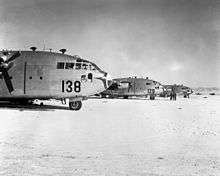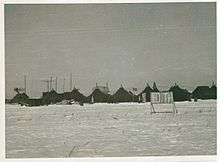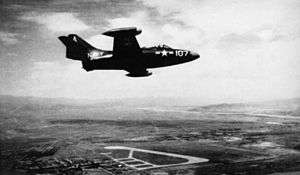Yonpo Airfield
| Yonpo Airfield Yonpo Air Base | |
|---|---|
|
F9F-2 of VF-721 about to attack Yonpo in 1951 | |
| Coordinates | 39°47′26″N 127°32′7″E / 39.79056°N 127.53528°E |
| Type | Military airfield |
| Site information | |
| Owner | Korean People's Air Force |
| Controlled by |
Imperial Japanese Army Air Service Korean People's Air Force United States Air Force |
| Site history | |
| Built | 1940s |
| Built by | Imperial Japanese Army Air Service |
| In use | 1940s-present |
| Materials | concrete |
| Battles/wars | Battle of Chosin Reservoir |
Yonpo Airfield, also known as Yonpo Air Base or K-27 Air Base, is an airport near Hamhung, South Hamgyong Province, North Korea.
History
Korean War


On 2 July 1950 the 19th Bombardment Group launched a strike on Yonpo Airfield based on faulty intelligence there were 65 Korean People's Air Force (KPAF) aircraft there, but only 16 KPAF aircraft were in the field, none of which were damaged by the airstrike.[1] On 19 July carrier aircraft of Task Force 77 attacked Yonpo destroying 15 aircraft.[2]
The Yonpo area was captured by the 5th and 7th Marines advancing from Wonsan on 30 October 1950[3] and the airfield was put into service by the UN forces. The USAF designated the base K-27.[4] The 35th Fighter-Interceptor Group[5] moved to the base on 18 November and was joined by the Marine Aircraft Group 12[6] on 1 December, both provided close air support to the U. S. Army X Corps and the 1st U.S. Marine Division surrounded at the Battle of Chosin Reservoir. X Corps established a casualty clearing and evacuation station at Yonpo for casualties evacuated from the Chosin.[7]
USAF units based there included:
- 35th Fighter-Interceptor Group from 18 November-7 December 1950, units attached included:
- 39th Fighter-Interceptor Squadron operating F-51Ds
- 40th Fighter-Interceptor Squadron operating F-51Ds
- 339th Fighter-Interceptor Squadron operating F-82Gs
- 437th Troop Carrier Wing operating C-46s
- 6150th Tactical Support Wing from 27 November-1 December 1950
USMC units based there included:
- Marine Aircraft Group 12 from 1–17 December 1950,[6] units attached included:
UN units based there included:
- No. 77 Squadron RAAF operating F-51Ds attached to the 35th Fighter-Interceptor Group
Following the successful retreat from the Chosin Reservoir, US Marines of Regimental Combat Teams 5 and 7 prepared a defensive line around Yonpo on 9 December, however General Douglas MacArthur ordered the withdrawal of X Corps to South Korea.[10] General MacArthur met with General Edward Almond at Yonpo on 11 December and approved the X Corps evacuation plan.[11] From 14–17 December USAF Combat Cargo Command moved 228 patients, 3,891 passengers, and 20,088 tons of cargo from Yonpo.[5] The aerial evacuation from Yonpo continued until 17 December when the field was closed and operations were moved to a temporary field at Hungnam harbour.[12]
Postwar
The KPAF continues to use the base and several squadrons of Antonov An-2s appear to be based there.
See also
References
- ↑ Futrell, Frank (1983). The United States Air Force in Korea, 1950-1953. Air Force History & Museums Program. p. 98. ISBN 9780912799711.
- ↑ Futrell, p.99
- ↑ Smith, Charles (2007). U.S. Marines in the Korean War. Government Printing Office. p. 203. ISBN 9780160872518.
- ↑ Y'Blood, William (2002). Down in the weeds: Close air support in Korea. Air Force Historical Studies Office. p. 21. ISBN 9781428990173.
- 1 2 "History Milestones Sunday, January 01, 1950 - Thursday, December 31, 1959". U.S. Air Force. Archived from the original on 2013-06-28. Retrieved 25 June 1950. Check date values in:
|access-date=(help) - 1 2 Smith, p.283-4
- ↑ Smith, p.286
- ↑ Smith, p.327
- ↑ Smith, p.634
- ↑ Smith, p.320
- ↑ Smith, p.321
- ↑ Smith, p.331
 This article incorporates public domain material from the United States Air Force website http://www.af.mil.
This article incorporates public domain material from the United States Air Force website http://www.af.mil. This article incorporates public domain material from websites or documents of the United States Marine Corps.
This article incorporates public domain material from websites or documents of the United States Marine Corps.
